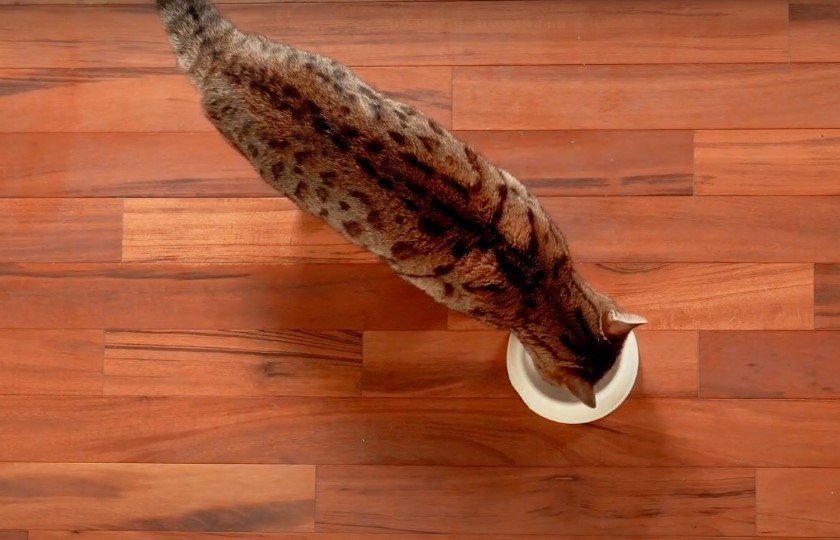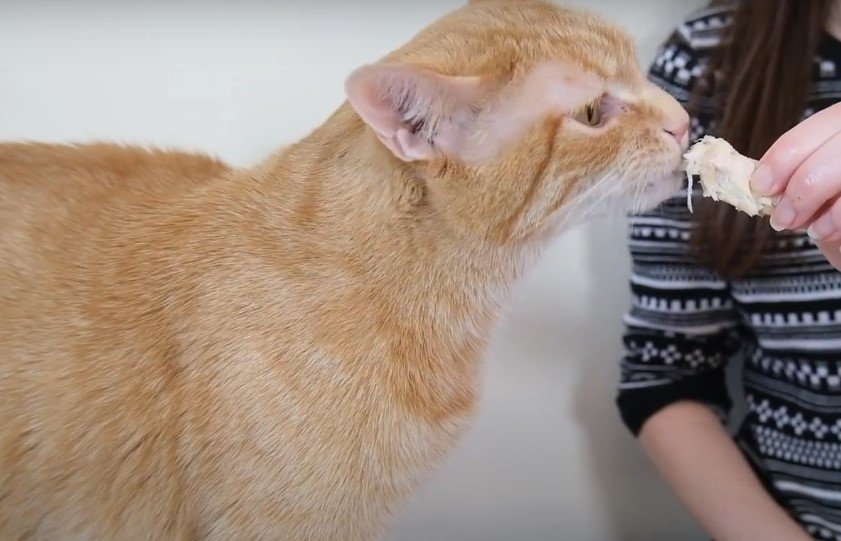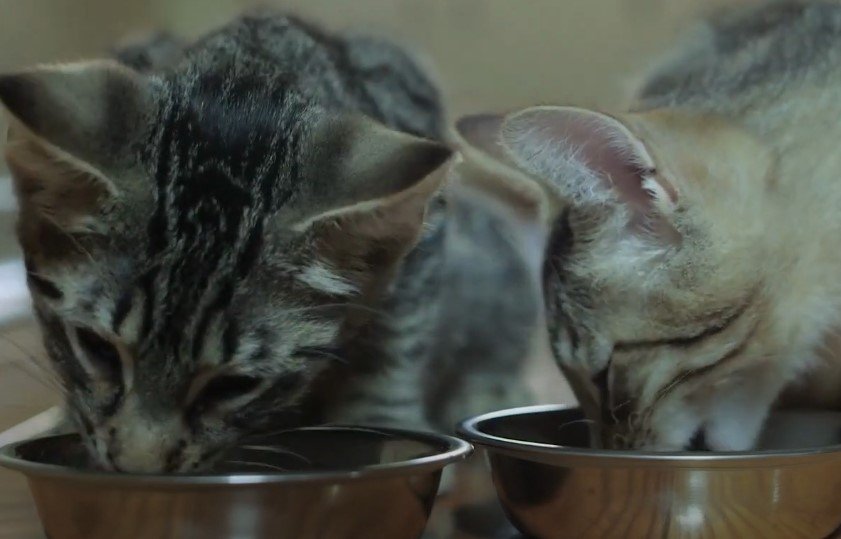
Cats are obligate carnivores, relying heavily on meat for their nutritional needs. But what if the food spoils and your cat eats old meat?
A common concern among many pet parents is: Can cats get food poisoning from old meat? The answer is yes, cats can get food poisoning from old meat. Old meat can grow harmful bacteria like Salmonella, E. coli, and Listeria, which can cause vomiting, diarrhea, fever, and dehydration in cats.
What Is Food Poisoning In Cats?
Food poisoning, or foodborne illness, occurs when animals eat contaminated food containing harmful bacteria, viruses, or toxins. Cats can also suffer from food poisoning if they consume spoiled or contaminated food.
Cats digest food differently from humans and have different tolerance levels to bacteria and toxins. This means their reaction to spoiled food can be different from ours.
Even though cats are obligate carnivores (natural meat eaters) and can eat raw chicken, there are still limits to what they can safely consume. If meat spoils or isn’t stored correctly, harmful bacteria, toxins, or parasites can grow, increasing the risk of food poisoning.
Cats with weaker immune systems—such as kittens, seniors, or sick cats—are at higher risk. Even small amounts of spoiled or toxic food can make them seriously ill.
What can happen if a cat gets food poisoning from old meat?
If a cat eats spoiled or contaminated meat, it can develop food poisoning, which may lead to digestive issues, infections, and even life-threatening complications. Here’s what can happen:
1. Digestive problems include vomiting, diarrhea (watery or bloody), loss of appetite, and abdominal pain (restlessness, hunching, or avoiding touch).
2. Foodborne illnesses or Bacterial infections like Salmonellosis, Botulism, and Listeriosis.
3. Untreated food poisoning can lead to sepsis (blood infection), respiratory failure (paralysis from botulism), and death.
Foodborne Illnesses in Cats
The most common foodborne illnesses include Salmonellosis, Botulism, and Listeriosis. These illnesses are caused by harmful bacteria found in raw or old meat, dairy, and improperly stored food.
1. Salmonellosis (Caused by Salmonella Bacteria)
Salmonellosis affects the digestive system and can spread to other parts of the body if untreated. Symptoms may appear within 12 to 72 hours after eating contaminated food.
Digestive Symptoms:
- Diarrhea
- Vomiting
- Loss of Appetite
- Fever
- Lethargy
- Dehydration
Severe Cases:
- Weight Loss – Prolonged diarrhea and vomiting lead to rapid weight loss.
- Sepsis (Blood Infection) – If Salmonella spreads through the bloodstream, it can cause life-threatening organ damage.
Risks:
Salmonella can spread to humans through cat feces, making hygiene very important.
2. Botulism (Caused by Clostridium botulinum Bacteria)
Botulism affects the nervous system by blocking signals between nerves and muscles. Symptoms usually appear 12 to 24 hours after eating spoiled meat, fish, or garbage.
Early Symptoms:
- Weakness
- Drooling
- Dilated Pupils
- Trouble standing or walking
Advanced Neurological Symptoms:
- Paralysis
- Difficulty Swallowing
- Breathing Problems
Severe Cases:
- Complete Paralysis – The cat may be unable to move, stand, or lift its head.
- Respiratory Failure – If chest muscles become paralyzed, breathing stops, which can be fatal.
Risks:
Botulism affects the nervous system and can lead to life-threatening paralysis if untreated.
3. Listeriosis (Caused by Listeria Bacteria)
Listeriosis affects the digestive system, nervous system, and internal organs. Symptoms can appear within a few days to two weeks after eating contaminated food.
Symptoms:
- Fever
- Loss of appetite and energy
- Vomiting and diarrhea
- Muscle stiffness or tremors
- In severe cases, brain inflammation (encephalitis), respiratory problems, weakness, and depression
- Diarrhea and Vomiting
- Loss of Appetite
Neurological Symptoms (If Listeria Spreads to the Brain):
- Muscle Stiffness or Tremors
- Head Tilt
- Circling or Walking in One Direction
- Seizures
Other Severe Symptoms:
- Fever – The cat may feel hot, restless, or hide in quiet places.
- Weakness and Depression – Affected cats may seem uninterested in their surroundings.
- Respiratory Problems – Difficulty breathing in severe cases.
Risks:
Kittens, senior cats, and those with weak immune systems are at higher risk. Listeria can also spread to humans through contaminated food.
Key Takeaways: When to Act Fast
| Symptoms | Salmonellosis | Botulism | Listeriosis |
| Vomiting & Diarrhea | ✅ Common | ❌ Rare | ✅ Common |
| Loss of Appetite | ✅ Yes | ✅ Yes | ✅ Yes |
| Lethargy | ✅ Yes | ✅ Yes | ✅ Yes |
| Fever | ✅ Yes | ❌ No | ✅ Yes |
| Muscle Weakness | ❌ No | ✅ Yes | ✅ Yes |
| Paralysis | ❌ No | ✅ Severe | ❌ No |
| Head Tilt & Seizures | ❌ No | ❌ No | ✅ Yes |
| Breathing Problems | ❌ No | ✅ Severe | ✅ Rare |
If you notice severe symptoms like paralysis, seizures, or difficulty breathing, take your cat to the vet immediately!

Causes of Food Poisoning in Cats
Cats can get food poisoning if they eat old or spoiled meat, or raw or undercooked food. Here are the main reasons why this happens:
1. Bacterial Contamination
Old or rotten food can grow harmful bacteria like:
- Salmonella – Causes vomiting, diarrhea, and fever.
- E. coli – This can lead to severe stomach issues and dehydration.
- Listeria – Dangerous for older cats and those with weak immunity.
2. Mold and Mycotoxins
Mold can grow on old food and release mycotoxins, which can be deadly. These toxins can make your cat very sick, causing shaking, seizures, or liver problems.
3. Expired or Spoiled Food
Old meat and expired pet food may smell fine but contain harmful bacteria and toxins. Even dry cat food can expire and cause illness.
4. Toxic Human Foods
Some human foods can cause poisoning in cats, including:
- Onions and Garlic can damage red blood cells, leading to anemia.
- Chocolate – Contains theobromine, a substance that is poisonous to cats.
- Dairy Products – Many cats are lactose intolerant, leading to stomach upset.
5. Chemical Contaminants
Food stored improperly or exposed to pesticides, cleaning agents, or spoiled packaging materials can become toxic. Always check food safety before feeding your cat.
How to Prevent Your Cat From Eating Spoiled Meat
Cats like to hunt and search for food, but eating spoiled meat can lead to serious health issues. Preventing your cat from consuming rotten food requires a combination of proper storage, safe feeding habits, and home precautions. Here’s how to keep your cat safe from contaminated meat.
1. Store Meat Properly
Old or rotten meat can contain harmful bacteria, such as Salmonella, E. coli, and Listeria, which can cause food poisoning.
- Refrigerate Fresh Meat: Store raw meat in a sealed container at or below 40°F (4°C).
- Freeze If Needed – If you won’t use meat within a couple of days, freeze it at 0°F (-18°C) to prevent bacterial growth.
- Check Expiration Dates – Always verify the freshness of store-bought meat before feeding your cat.
2. Feed Your Cat Fresh, Safe Food
Cats don’t always recognize when food has gone bad, so they rely on you to provide safe meals.
- Use High-Quality Cat Food – Commercial cat food is specifically formulated to be balanced and safe. Choose trusted brands.
- Avoid Raw Diets Without Vet Guidance. Raw meat poses a greater risk of bacterial contamination. If feeding raw meat, ensure it’s fresh and properly handled.
- Never Leave Wet Food Out for Long, because cats can get food poisoning from wet food. To prevent spoilage, serve wet food in small portions and remove leftovers after 30-60 minutes.
- Cook Meat Thoroughly – Cooking meat to an internal temperature of 165°F (75°C) kills harmful bacteria like Salmonella and Listeria.
3. Keep Trash and Leftovers Out of Reach
Cats are curious and may scavenge spoiled food from trash cans or leftover scraps.
- Use a Covered Trash Bin – A lid keeps cats from accessing food scraps.
- Dispose of Old Meat Properly – Wrap spoiled meat in a plastic bag before throwing it away to prevent odor and scavenging.
- Clean Up Immediately – Don’t leave raw meat or scraps on counters where your cat can reach them.
4. Supervise Outdoor and Stray Cats
Outdoor cats have a higher risk of finding and eating spoiled food.
- Keep Your Cat Indoors – Indoor cats are less likely to come across rotten meat.
- Watch for Signs of Scavenging – If your cat roams outside, monitor its behavior and check its mouth for unusual smells.
- Avoid Feeding Stray Cats Leftover Meat – It may be spoiled and could harm them. Instead, provide dry or canned cat food.
5. Educate Family Members
Everyone in your home should know what is safe and unsafe for your cat.
- Teach Kids Not to Share Leftovers – Even small scraps can be dangerous if the food is spoiled.
- Remind Guests Not to Feed Your Cat – Not everyone knows which foods are harmful to cats.
6. Recognize Signs of Food Spoilage
Knowing what spoiled meat looks and smells like helps prevent accidental feeding.
- Unusual Odor – Spoiled meat has a strong, foul smell.
- Slimy or Sticky Texture – Bacteria produce a sticky film on old meat.
- Discoloration – Green, gray, or dark spots indicate bacterial growth.

How To Diagnose Food Poisoning in Cats
Here’s how you can diagnose food poisoning in cats easily by following these steps:
1. Observing Symptoms at Home
Sudden vomiting, diarrhea (watery or bloody), loss of appetite, lethargy, fever, drooling, trouble swallowing, muscle weakness, or paralysis may signal food poisoning in cats. If your cat shows multiple symptoms, it’s time for a vet visit.
2. Veterinary Examination
A vet will check hydration levels, body temperature, and abdominal pain to assess cat food poisoning.
3. Diagnostic Tests
To confirm food poisoning, the vet may perform tests:
- Blood Tests
A vet checks for infection, dehydration, and organ damage. A high white blood cell count may indicate bacterial poisoning, while abnormal liver or kidney values may suggest toxin exposure.
- Fecal Tests (Stool Sample Analysis)
Tests detect harmful bacteria like Salmonella or Listeria and identify parasites or viruses with similar symptoms.
- Vomit Analysis
If your cat has vomited recently, the vet may examine the contents for toxins or bacteria.
- Urinalysis (Urine Test)
Tests evaluate kidney function, hydration levels, and toxins affecting urine output.
- X-rays or Ultrasound
X-rays or ultrasounds check for blockages, foreign objects, or digestive issues that mimic food poisoning.
- Toxin-Specific Testing (For Severe Cases)
If a specific toxin or bacteria is suspected, additional tests may include:
- Botulinum toxin test (for botulism).
- Listeria culture test (for listeriosis).
- Heavy metal screening (if poisoning from lead or mercury is suspected).
Treatment of Food Poisoning in Cats
Food poisoning in cats requires fast action to prevent serious complications. Treatment depends on the type of infection and severity of symptoms. Below is a clear breakdown of how vets treat Salmonellosis, Botulism, and Listeriosis.
1. Treatment for Salmonellosis (Caused by Salmonella Bacteria)
Mild Cases:
- Hydration: Ensure clean water is available to prevent dehydration.
- Bland Diet: Vets may recommend boiled chicken and rice for easy digestion.
- Monitoring: Symptoms usually improve within a few days if mild.
Severe Cases (Diarrhea, Vomiting, Fever, or Weakness):
- IV Fluids: To restore lost fluids and electrolytes.
- Antibiotics: Given if the infection spreads beyond the gut (risk of sepsis).
- Probiotics: Help restore healthy gut bacteria.
- Isolation: To prevent the spread of bacteria to other pets or humans.
2. Treatment for Botulism (Caused by Clostridium botulinum Bacteria)
Mild Cases (Weakness, Drooling, Trouble Swallowing):
- Supportive Care: Keeping the cat hydrated and monitoring symptoms.
- Soft Food & Assisted Feeding: If swallowing is difficult.
Severe Cases (Paralysis, Breathing Problems):
- Hospitalization: Needed for intensive monitoring.
- IV Fluids: To prevent dehydration and maintain organ function.
- Antitoxin Therapy: If available, it neutralizes botulinum toxins (most effective early).
- Ventilator Support: If the breathing muscles are affected.
3. Treatment for Listeriosis (Caused by Listeria Bacteria)
Mild Cases (Diarrhea, Loss of Appetite):
- Fluids & Electrolytes: To prevent dehydration.
- Nutritional Support: Soft, high-calorie food to maintain strength.
Severe Cases (Neurological Symptoms Like Seizures or Head Tilt):
- Antibiotics (Penicillin, Ampicillin): To kill Listeria bacteria.
- Anti-Seizure Medications: If the cat develops seizures.
- Hospitalization: If the cat is too weak to eat or drink.
Key Takeaways
| Illness | Mild Cases | Severe Cases |
| Salmonellosis | Hydration, probiotics | IV fluids, antibiotics |
| Botulism | Supportive care | Antitoxin, ventilator support |
| Listeriosis | Fluids, soft diet | Antibiotics, anti-seizure meds |
FAQ
1. Can cats recover from food poisoning?
Yes, cats can recover from food poisoning with prompt treatment. Mild cases often resolve with hydration and rest, while severe cases may need IV fluids, antibiotics, or antitoxins.
2. How long can you leave cat food out for?
The time you can leave cat food out depends on the type: dry food is safe for up to 24 hours but best within 6-8 hours, while wet food should be eaten within 1-2 hours and discarded after 4 hours to prevent spoilage.
3. What should I do if my cat eats spoiled food?
If your cat ate spoiled food, take these steps:
- Monitor symptoms like vomiting, diarrhea, drooling, lethargy, or weakness.
- Keep your cat hydrated.
- Don’t induce vomiting
- Call a vet if symptoms appear
- To prevent future issues, throw away spoiled food, secure trash, and store food properly.
4. Can my cat get food poisoning from canned meat?
Cats can get food poisoning from expired, improperly stored, or contaminated canned meat. The meat may contain harmful bacteria like Salmonella, Listeria, or Botulism. Always check the dates, store the meat properly, and discard damaged cans.
5. Is raw meat safe for my cat?
Raw meat can be risky for cats. It may contain harmful bacteria, like Salmonella, E. coli, and Listeria, and can lead to food poisoning. While cats are natural carnivores, unprocessed raw meat can cause digestive issues and infections.
Conclusion
Old meat can be dangerous for cats and cause food poisoning. Cat owners should ensure their pets eat fresh, safe food. Proper food storage, such as refrigeration and discarding expired meat, helps prevent foodborne illnesses and keeps cats healthy. If your cat shows any symptoms of food poisoning, take it to the vet immediately.

